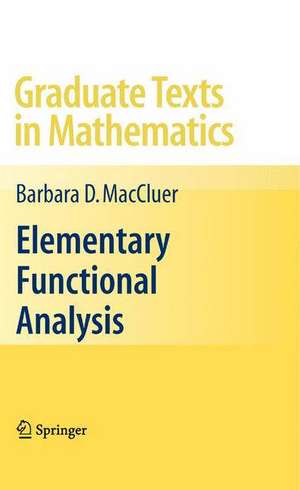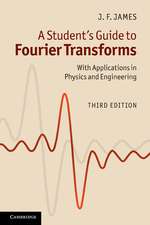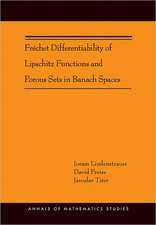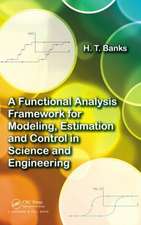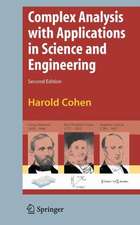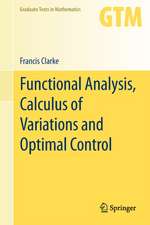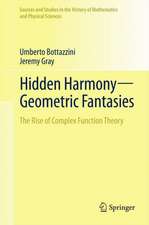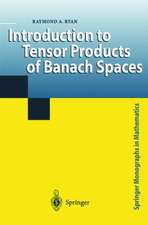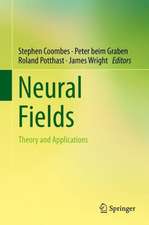Elementary Functional Analysis: Graduate Texts in Mathematics, cartea 253
Autor Barbara MacClueren Limba Engleză Hardback – 21 noi 2008
| Toate formatele și edițiile | Preț | Express |
|---|---|---|
| Paperback (1) | 383.71 lei 6-8 săpt. | |
| Springer – 19 noi 2010 | 383.71 lei 6-8 săpt. | |
| Hardback (1) | 490.25 lei 6-8 săpt. | |
| Springer – 21 noi 2008 | 490.25 lei 6-8 săpt. |
Din seria Graduate Texts in Mathematics
- 17%
 Preț: 528.66 lei
Preț: 528.66 lei -
 Preț: 402.87 lei
Preț: 402.87 lei -
 Preț: 383.85 lei
Preț: 383.85 lei -
 Preț: 337.45 lei
Preț: 337.45 lei - 17%
 Preț: 398.97 lei
Preț: 398.97 lei -
 Preț: 355.82 lei
Preț: 355.82 lei -
 Preț: 412.24 lei
Preț: 412.24 lei -
 Preț: 404.47 lei
Preț: 404.47 lei -
 Preț: 289.88 lei
Preț: 289.88 lei - 17%
 Preț: 365.79 lei
Preț: 365.79 lei - 17%
 Preț: 359.45 lei
Preț: 359.45 lei - 15%
 Preț: 488.70 lei
Preț: 488.70 lei -
 Preț: 381.92 lei
Preț: 381.92 lei - 13%
 Preț: 357.75 lei
Preț: 357.75 lei -
 Preț: 407.88 lei
Preț: 407.88 lei - 13%
 Preț: 352.49 lei
Preț: 352.49 lei - 13%
 Preț: 358.86 lei
Preț: 358.86 lei - 13%
 Preț: 393.48 lei
Preț: 393.48 lei - 11%
 Preț: 351.00 lei
Preț: 351.00 lei - 17%
 Preț: 359.58 lei
Preț: 359.58 lei -
 Preț: 350.45 lei
Preț: 350.45 lei -
 Preț: 399.74 lei
Preț: 399.74 lei -
 Preț: 498.91 lei
Preț: 498.91 lei - 20%
 Preț: 571.26 lei
Preț: 571.26 lei - 15%
 Preț: 546.59 lei
Preț: 546.59 lei -
 Preț: 498.69 lei
Preț: 498.69 lei - 15%
 Preț: 354.39 lei
Preț: 354.39 lei -
 Preț: 313.10 lei
Preț: 313.10 lei - 13%
 Preț: 427.39 lei
Preț: 427.39 lei - 17%
 Preț: 363.59 lei
Preț: 363.59 lei -
 Preț: 340.18 lei
Preț: 340.18 lei - 17%
 Preț: 364.47 lei
Preț: 364.47 lei - 17%
 Preț: 366.47 lei
Preț: 366.47 lei - 17%
 Preț: 366.06 lei
Preț: 366.06 lei -
 Preț: 247.59 lei
Preț: 247.59 lei - 17%
 Preț: 367.70 lei
Preț: 367.70 lei - 13%
 Preț: 356.79 lei
Preț: 356.79 lei - 17%
 Preț: 398.78 lei
Preț: 398.78 lei - 17%
 Preț: 398.51 lei
Preț: 398.51 lei - 17%
 Preț: 496.63 lei
Preț: 496.63 lei - 15%
 Preț: 482.97 lei
Preț: 482.97 lei -
 Preț: 401.99 lei
Preț: 401.99 lei - 17%
 Preț: 366.56 lei
Preț: 366.56 lei - 20%
 Preț: 449.73 lei
Preț: 449.73 lei -
 Preț: 380.34 lei
Preț: 380.34 lei -
 Preț: 364.79 lei
Preț: 364.79 lei - 17%
 Preț: 427.27 lei
Preț: 427.27 lei -
 Preț: 357.19 lei
Preț: 357.19 lei
Preț: 490.25 lei
Nou
Puncte Express: 735
Preț estimativ în valută:
93.82€ • 97.21$ • 78.30£
93.82€ • 97.21$ • 78.30£
Carte tipărită la comandă
Livrare economică 22 martie-05 aprilie
Preluare comenzi: 021 569.72.76
Specificații
ISBN-13: 9780387855288
ISBN-10: 0387855289
Pagini: 207
Ilustrații: X, 208 p. 5 illus.
Dimensiuni: 155 x 235 x 15 mm
Greutate: 0.48 kg
Ediția:1st Edition.2nd Printing. 2008
Editura: Springer
Colecția Springer
Seria Graduate Texts in Mathematics
Locul publicării:New York, NY, United States
ISBN-10: 0387855289
Pagini: 207
Ilustrații: X, 208 p. 5 illus.
Dimensiuni: 155 x 235 x 15 mm
Greutate: 0.48 kg
Ediția:1st Edition.2nd Printing. 2008
Editura: Springer
Colecția Springer
Seria Graduate Texts in Mathematics
Locul publicării:New York, NY, United States
Public țintă
GraduateCuprins
Hilbert Space Preliminaries.- Operator Theory Basics.- The Big Three.- Compact Operators.- Banach and C -Algebras.- The Spectral Theorem.
Recenzii
From the reviews:
A review from Michael Berg, MAA Online:
Barbara D. MacCluer’s compact text, Elementary Functional Analysis, is an unusual book on a number of counts. For one, it unmistakably conveys the author’s abundant enthusiasm for her subject as well as her evident joy at presenting mathematics in general: it’s a rare thing that a GTM text is riddled with apposite quotes, anecdotes, and historical asides, all making for a wonderful personal touch and drawing the reader into dialogue with the author in an almost palpable way. It works quite well and makes for an enhanced experience of learning this beautiful but occasionally austere material in an almost informal setting. Talking about flesh and blood mathematicians goes a long way toward taking the edge off, so to speak, as this intrinsically exciting but dense material is presented more palatably by virtue of introducing this human element. It makes for very good reading.
Each of the six chapters of the book in introduced by a well-chosen quote, often hinting in a very useful manner at the material that is to follow. I particularly like MacCluer’s choice of Dunford and Schwartz to start off her third chapter: "In linear spaces with a suitable topology one encounters three far-reaching principles concerning continuous linear transformations…" We find out quickly that these "Big Three" (as the chapter is titled) are uniform boundedness, the open mapping theorem, and Hahn-Banach. MacCluer quickly goes on to cover these three gems in a most effective and elegant manner, as well as a number of their corollaries or, in her words, "close cousins," such as the closed graph theorem and Banach-Steinhaus.
And this brings me to the next count on which Elementary Functional Analysis is unusual: the density of gorgeous mathematics, presented elegantly and concisely, is truly remarkable, even if the text is meant only as an introduction to what the author herself calls a "huge field." Everything is proved completely, at a pretty high but not uncomfortable pace, and, as already indicated, the flow of material is excellent. What’s more, each chapter is followed by a long list of exercises that should afford the reader the opportunity to take it all to the next level, from absorbing the presentation (take notes, fill the margin of the book with comments, doodle… whatever floats your boat…) to doing battle on one’s own, so to speak (although some problems come equipped with hints).
So it is that in the span of about 200 pages, MacCluer takes the reader from Hilbert space preliminaries to Banach- and C*-algebras and, of course, the spectral theorem (introduced by a quote from Paul Halmos stressing that it all begins with Hermitian matrices). The book’s preface indicates that MacCluer’s intent is to present an effective introduction to the "huge field" of functional analysis, suitable for self-study, with modest preliminary requirements placed on the reader. She achieves her goal beautifully: Elementary Functional Analysis is a wonderful book.
-Michael Berg is Professor of Mathematics at Loyola Marymount University in Los Angeles, CA.
“MacCluer (Univ. of Virginia), right from the opening epigraph (from Hadamard), acknowledges the strangeness of functional analysis. … provide intellectual context, miraculously manages to develop in detail just what a student must learn to continue in a grounded way in quite a number of subjects: advanced functional analysis, single operator theory, Banach space geometry, and Banach or operator algebras. Summing Up: Highly recommended. Upper-division undergraduate through professional collections.” (D. V. Feldman, Choice, Vol. 47 (3), November, 2009)
“Books on functional analysis are not exactly ubiquitous, but every publishing house has several text books in this area on its backlist. MacCluer’s book is an excellent new entry. … What distinguishes this book from many others is its reader-friendly style that is opposite to the dry definition-theorem-proof format found in many other expositions. … Each chapter is accompanied by a section of well-chosen, highly interesting and often non-canonical exercises … . It is a pleasure to read and highly recommended.” (Dirk Werner, Mathematical Reviews, Issue 2010 b)
“The present textbook is a concise introduction to linear functional analysis. … What I like about the book is its user-friendly style, the many historic remarks and comments mingled with the main text, and the wealth of nice exercises. … In summary, it is a nice contribution to the existing literature on this subject.” (G. Teschl, Internationale Mathematische Nachrichten, Issue 213, April, 2010)
“This interesting book covers material from the basic elements of functional analysis to more advanced topics such as spectral theory and is intended for specialists and graduate students in mathematics and other disciplines. … Each chapter includes some historical commentaries and many examples which make the book readable as well as a lot of exercises which invite the reader on a long trip to the ‘functional analysis land’. The book consists of … six chapters, a bibliography containing 48 references and subject index.” (Mohammad Sal Moslehian, Zentralblatt MATH, Vol. 1170, 2009)
“The book being reviewed is written mainly for graduate students, although much of the material can also be studied by final year students. … There is an abundance of examples to illustrate the concepts involved. … The presentation of material is excellent: elegant, precise and concise; everything is completely proved at a reasonably comfortable pace. … It is a beautiful and wonderful small book to be studied, treasured and kept for reference.” (Peter Shiu, The Mathematical Gazette, Vol. 94 (531), November, 2010)
Barbara D. MacCluer’s compact text, Elementary Functional Analysis, is an unusual book on a number of counts. For one, it unmistakably conveys the author’s abundant enthusiasm for her subject as well as her evident joy at presenting mathematics in general: it’s a rare thing that a GTM text is riddled with apposite quotes, anecdotes, and historical asides, all making for a wonderful personal touch and drawing the reader into dialogue with the author in an almost palpable way. It works quite well and makes for an enhanced experience of learning this beautiful but occasionally austere material in an almost informal setting. Talking about flesh and blood mathematicians goes a long way toward taking the edge off, so to speak, as this intrinsically exciting but dense material is presented more palatably by virtue of introducing this human element. It makes for very good reading.
Each of the six chapters of the book in introduced by a well-chosen quote, often hinting in a very useful manner at the material that is to follow. I particularly like MacCluer’s choice of Dunford and Schwartz to start off her third chapter: "In linear spaces with a suitable topology one encounters three far-reaching principles concerning continuous linear transformations…" We find out quickly that these "Big Three" (as the chapter is titled) are uniform boundedness, the open mapping theorem, and Hahn-Banach. MacCluer quickly goes on to cover these three gems in a most effective and elegant manner, as well as a number of their corollaries or, in her words, "close cousins," such as the closed graph theorem and Banach-Steinhaus.
And this brings me to the next count on which Elementary Functional Analysis is unusual: the density of gorgeous mathematics, presented elegantly and concisely, is truly remarkable, even if the text is meant only as an introduction to what the author herself calls a "huge field." Everything is proved completely, at a pretty high but not uncomfortable pace, and, as already indicated, the flow of material is excellent. What’s more, each chapter is followed by a long list of exercises that should afford the reader the opportunity to take it all to the next level, from absorbing the presentation (take notes, fill the margin of the book with comments, doodle… whatever floats your boat…) to doing battle on one’s own, so to speak (although some problems come equipped with hints).
So it is that in the span of about 200 pages, MacCluer takes the reader from Hilbert space preliminaries to Banach- and C*-algebras and, of course, the spectral theorem (introduced by a quote from Paul Halmos stressing that it all begins with Hermitian matrices). The book’s preface indicates that MacCluer’s intent is to present an effective introduction to the "huge field" of functional analysis, suitable for self-study, with modest preliminary requirements placed on the reader. She achieves her goal beautifully: Elementary Functional Analysis is a wonderful book.
-Michael Berg is Professor of Mathematics at Loyola Marymount University in Los Angeles, CA.
“MacCluer (Univ. of Virginia), right from the opening epigraph (from Hadamard), acknowledges the strangeness of functional analysis. … provide intellectual context, miraculously manages to develop in detail just what a student must learn to continue in a grounded way in quite a number of subjects: advanced functional analysis, single operator theory, Banach space geometry, and Banach or operator algebras. Summing Up: Highly recommended. Upper-division undergraduate through professional collections.” (D. V. Feldman, Choice, Vol. 47 (3), November, 2009)
“Books on functional analysis are not exactly ubiquitous, but every publishing house has several text books in this area on its backlist. MacCluer’s book is an excellent new entry. … What distinguishes this book from many others is its reader-friendly style that is opposite to the dry definition-theorem-proof format found in many other expositions. … Each chapter is accompanied by a section of well-chosen, highly interesting and often non-canonical exercises … . It is a pleasure to read and highly recommended.” (Dirk Werner, Mathematical Reviews, Issue 2010 b)
“The present textbook is a concise introduction to linear functional analysis. … What I like about the book is its user-friendly style, the many historic remarks and comments mingled with the main text, and the wealth of nice exercises. … In summary, it is a nice contribution to the existing literature on this subject.” (G. Teschl, Internationale Mathematische Nachrichten, Issue 213, April, 2010)
“This interesting book covers material from the basic elements of functional analysis to more advanced topics such as spectral theory and is intended for specialists and graduate students in mathematics and other disciplines. … Each chapter includes some historical commentaries and many examples which make the book readable as well as a lot of exercises which invite the reader on a long trip to the ‘functional analysis land’. The book consists of … six chapters, a bibliography containing 48 references and subject index.” (Mohammad Sal Moslehian, Zentralblatt MATH, Vol. 1170, 2009)
“The book being reviewed is written mainly for graduate students, although much of the material can also be studied by final year students. … There is an abundance of examples to illustrate the concepts involved. … The presentation of material is excellent: elegant, precise and concise; everything is completely proved at a reasonably comfortable pace. … It is a beautiful and wonderful small book to be studied, treasured and kept for reference.” (Peter Shiu, The Mathematical Gazette, Vol. 94 (531), November, 2010)
Textul de pe ultima copertă
This text is intended for a one-semester introductory course in functional analysis for graduate students and well-prepared advanced undergraduates in mathematics and related fields. It is also suitable for self-study, and could be used for an independent reading course for undergraduates preparing to start graduate school.
While this book is relatively short, the author has not sacrificed detail. Arguments are presented in full, and many examples are discussed, making the book ideal for the reader who may be learning the material on his or her own, without the benefit of a formal course or instructor. Each chapter concludes with an extensive collection of exercises.
The choice of topics presented represents not only the author's preferences, but also her desire to start with the basics and still travel a lively path through some significant parts of modern functional analysis. The text includes some historical commentary, reflecting the author's belief that some understanding of the historical context of the development of any field in mathematics both deepens and enlivens one's appreciation of the subject.
The prerequisites for this book include undergraduate courses in real analysis and linear algebra, and some acquaintance with the basic notions of point set topology. An Appendix provides an expository discussion of the more advanced real analysis prerequisites, which play a role primarily in later sections of the book.
Barbara MacCluer is Professor of Mathematics at University of Virginia. She also co-authored a book with Carl Cowen, Composition Operators on Spaces of Analytic Functions (CRC 1995).
While this book is relatively short, the author has not sacrificed detail. Arguments are presented in full, and many examples are discussed, making the book ideal for the reader who may be learning the material on his or her own, without the benefit of a formal course or instructor. Each chapter concludes with an extensive collection of exercises.
The choice of topics presented represents not only the author's preferences, but also her desire to start with the basics and still travel a lively path through some significant parts of modern functional analysis. The text includes some historical commentary, reflecting the author's belief that some understanding of the historical context of the development of any field in mathematics both deepens and enlivens one's appreciation of the subject.
The prerequisites for this book include undergraduate courses in real analysis and linear algebra, and some acquaintance with the basic notions of point set topology. An Appendix provides an expository discussion of the more advanced real analysis prerequisites, which play a role primarily in later sections of the book.
Barbara MacCluer is Professor of Mathematics at University of Virginia. She also co-authored a book with Carl Cowen, Composition Operators on Spaces of Analytic Functions (CRC 1995).
Caracteristici
Large number of high quality exercises Concise and gentle approach with a unique set of topics Historical details are spread throughout the book This book has been thoroughly class-tested
